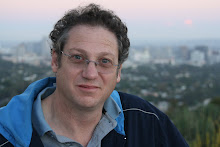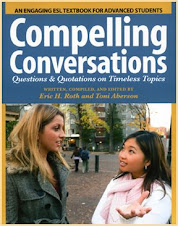Class bookends, both beginnings and endings, deserve special attention. This teaching proverb becomes more important in short term summer English programs where ESL students have traveled thousands of miles to study English.
As so often, I tend to learn by stumbling. Yet, over the years, I’ve developed a rather effective last class ESL lecture around a simple theme: Make Change Your Friend.
Working in an Intensive English Program (IEP) during the summer provides many satisfactions., but sometimes it feels like the course ends just when you have finally begun to really know your students. The students, often college age and less focused on grades than regular university students, come to study English, but also to enjoy themselves in Southern California. The classes tend to more relaxed, looser, and casual than my usual teaching situations, but more goal-focused and academic than adult education classes filled with working immigrants. The students, often unused to choosing their own readings and talking with an interested instructor, appreciate the personal feedback. Many students are also on their first trip to California and the United States, and have had rather disappointing experiences with rigid educational institutions back in their native countries.Therefore, many students enter their last class feeling rather down. Vacation is almost over. Few exude excitement about returning home. How do you change that atmosphere to emphasize the positive and provide an exceptional last ESL class?
What are you looking forward to? That's the question I ask on the attendance sheet.
Next, the lesson begins with a review of changes in their own lives over the last 10 years, and small personal chit-chats with each student. I tend to focus, just a bit, on the present perfect as they write 5 questions to ask their conversation partner and classmates. Most students are in college, but a few are working professionals a bit older. Studying - and living in -
By zooming out a bit more, we shift the conversation to changes - social, economic, or cultural - in our native countries over the last 10 years. The students usually provide a wide range of examples. Sometimes we also indicate how we would like our countries and cultures to change.
We soon shift to technological changes - and students share their experiences with different technologies. Of course, technology continues to improve - providing an optimistic twist. Computers are faster, video editing easier, and cell phones better. The evidence for material progress seems overwhelming.
Taking this theme a bit further, I note how the many uses of medical technology. People can live longer, new hearts installed, even limbs restored. From implants to cosmetic surgery, medical devices are changing our experience as humans. Are humans changing too? We live in fantastic times - unlike any previous generation.
I proceed to review themes from previous class readings and discussions from healthy relationships and elections to changes in human reproduction and evolving definitions of marriage. With a nod toward the great science fiction film Blade Runner, I ask “what makes humans human?” Let’s be humane as long as we human, as a Roman stoic philosopher advised.
Finally, quoting former President Clinton, I urge them to embrace change. “Make change your friend,” advised
Then, students write down three ways they can make change their friend. It’s a positive, look forward conclusion to a short English program. Soon class ends, students snap pictures with digital cameras, and exchange emails.
We make change our friend - even if the change is ending a wonderful, educational vacation. Students say goodbye to their
The journey of life continues. Make change your friend.
What do you on your last lesson?
Create Compelling Conversations.
Visit www.CompellingConversations.com






No comments:
Post a Comment